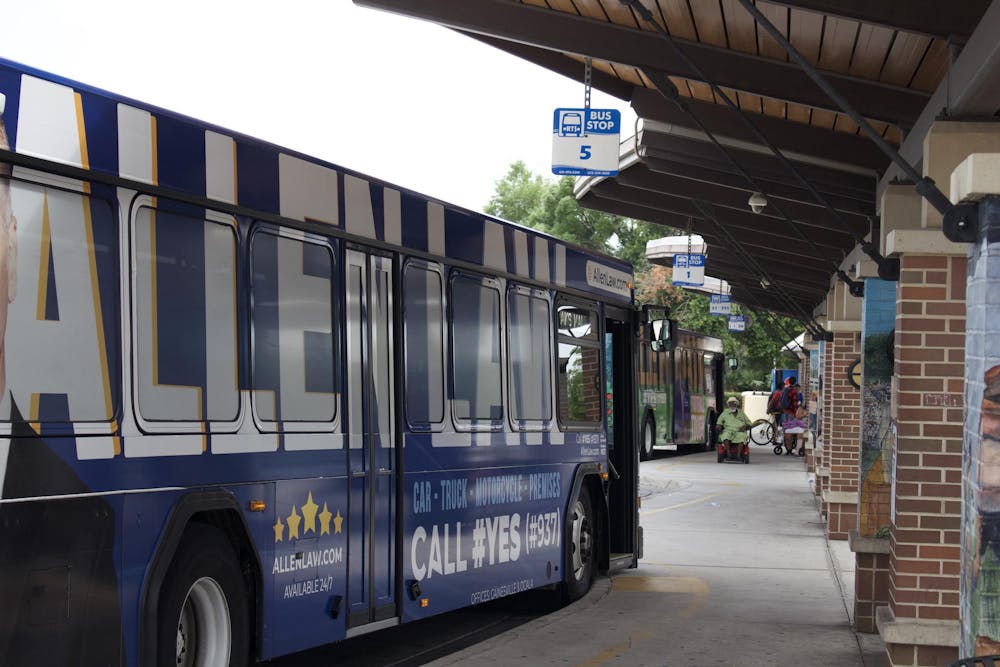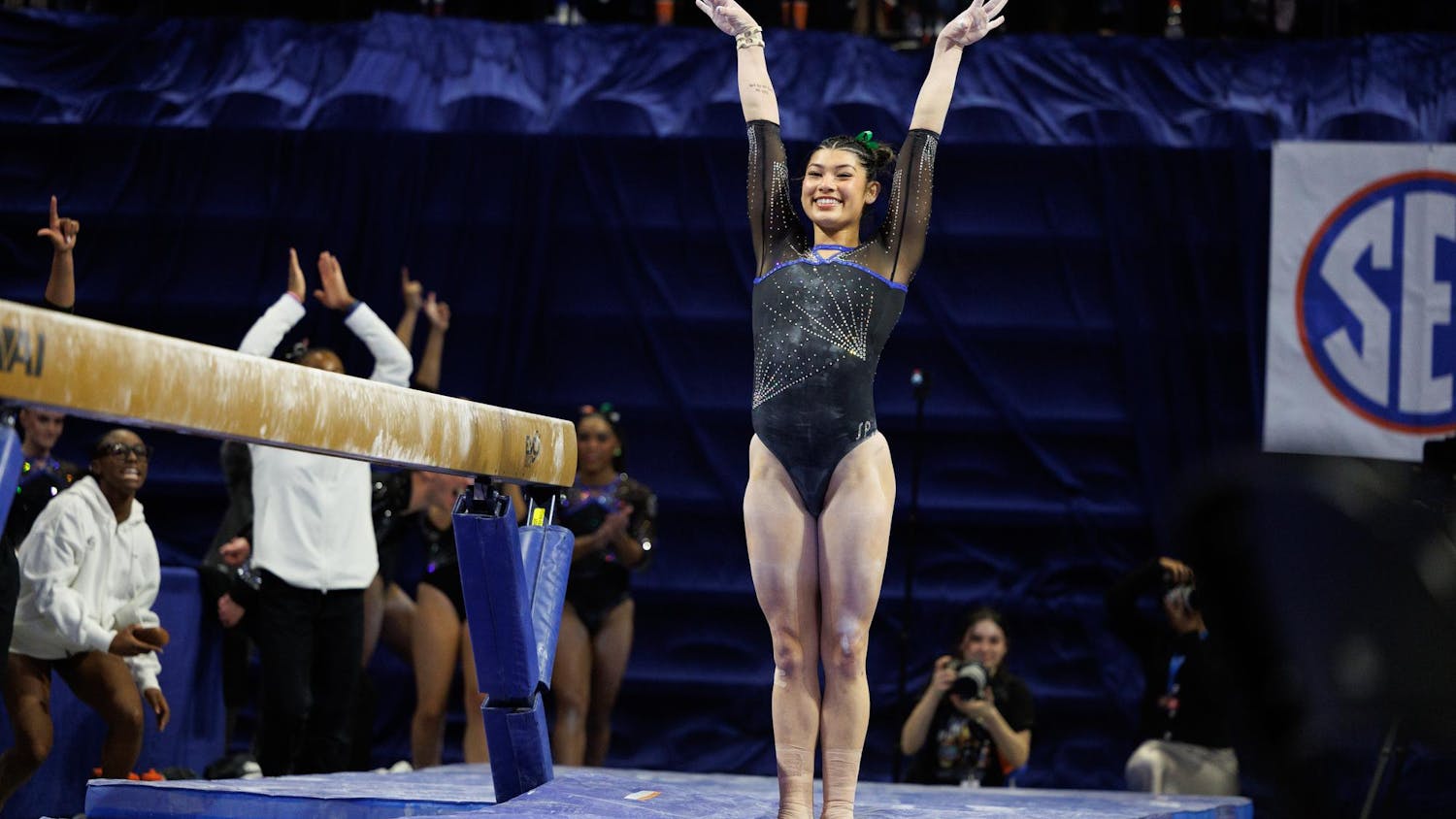This article has been updated with response from members of UF Transportation and Parking Services. It has also been updated to better reflect UF's share in RTS funding.
During the first few days of school, student frustration with UF’s funding cuts for the Regional Transit System was clear as people squeezed into crowded — and often late — buses.
The number of available bus routes decreased just a few weeks before thousands of UF students arrived on campus, who are the first to see the effects of the funding cuts when the university is at its most crowded.
UF reallocated funds from RTS, which serves a large portion of Gainesville with 39 routes, to campus-specific transportation, mainly the Campus Connector, in May.
Route adjustments went into effect June 30, eliminating four routes: Routes 16, 34, 35 and 711. Additionally, Route 126 will run with reduced service.
Those routes provided almost 271,000 passenger trips — about 9% of RTS’s total trips — since October 2024 to March 2025, according to the bus service.
Other routes had to change to cover areas the eliminated routes once serviced, leading to confusion and longer wait times for riders.
RTS’s total operating budget fell by 28%, according to a June press release from the City of Gainesville. From 2025 to 2026, UF cut its funding toward RTS by about 13%.
“If UF will participate at the level they used to participate in, we can go back to the level of service that we used to provide,” Gainesville Mayor Harvey Ward said.
UF’s contributions to the system made up almost half of RTS’s operating budget before the university decreased its funding, Ward said.
“The changes to RTS, the inconveniences that you see to the system, are a direct result of cuts that UF made,” Ward said.
The cuts impact a large portion of the UF student population, and UF students have expressed frustration as available routes have decreased and the ones that are available can be overcrowded.
Effective and efficient
Jeremiah McInnis, the Associate Director of Transportation at UF, said funding for transportation hasn’t increased since 2015, but the RTS’s operational costs in the contract have increased.
UF decreased its funding for RTS and instead shifted its focus to Campus Connectors, which have been running on campus since 2019. McInnis said the hourly rate to run Campus Connectors is lower than the hourly rate required to use RTS services.
“We've had a comprehensive review of the whole system, all of our transit options and available funding,” he said. “We just wanted to try and look at everything we're doing and ensure that we're using the funding as efficiently and effectively as possible.”
Campus Connectors run more frequently than the RTS buses that previously ran on campus, he said, and they run later in the evening.
Campus Connectors are more effective economically, he said, so UF can put more shuttles on the road and increase hours of service for UF students.
McInnis said the beginning of each fall semester is “typically extremely chaotic and hectic” as students adapt to being back on campus, but he thinks it will “continue to even out.” Buses and shuttles are expected to be full, he said, but Campus Connectors aren’t “leaving people behind.”
Kevin Sowers, UF associate vice president for business affairs, said RTS previously had 12 operating buses on campus. Now, RTS operates three buses and UF operates the other nine.
“There’s no real change in the quantity of buses on that service,” Sowers said.
Sowers added that he and McInnis are “constantly” monitoring transportation, which includes calling RTS daily to gather information on routes and riding the shuttles to perform a firsthand evaluation of transportation services on campus.
“This is something that we’re really passionate about,” McInnis said. “We really want to try and make the most efficient and effective transit system for our students using their funds.”
Growing pains
Many students express their disappointment through social media platforms, such as Reddit and YikYak, where users have posted photos of crowded buses and described their experiences with long wait times.
Melissa Castellano, a 21-year-old UF health education senior, began using RTS services this past summer. The transition from the summer to the fall semester was “shocking,” she said.
“Now, when I ride the bus, I have to stand among other students,” Castellano said. “We skipped several stops, because there’s not enough space.”
Castellano initially planned on using the bus as her primary form of transportation for the fall semester. However, she recently purchased a parking decal because she felt RTS was no longer reliable.
Syvvie Riffle, an 18-year-old UF exploratory freshman, is new to Gainesville and said part of why they chose UF was because of public transportation. But, for their first week of classes, they felt “scared” to use RTS due to route changes.
Of the 39 remaining routes offered by RTS, only two stayed the same: Routes 10 and 52.
To help with the confusion, the City of Gainesville created the “Find My Bus” number, which allows riders to text the bus stop ID at any stop RTS services to receive real-time updates on the status of their bus. This shows the “city is reaffirming its commitment to community mobility,” according to a City of Gainesville press release.
During the first week of classes, TAPS staff members were also stationed at popular bus stops throughout campus to answer questions about how to navigate the new system.
“As a first-year student, I was really underwhelmed with the RTS here,” Riffle said. “There needs to be more funding to the system to make Gainesville the high public transport city that it was said to be.”
The Gainesville chapter of the Sunrise Movement, a UF student organization focused on sustainability, has been closely following the RTS funding cuts. Currently, it's spreading a “Help Save RTS” petition through social media.
Ana Ferreira, the 21-year-old Sunrise Movement president, said the purpose of the petition extends further than just collecting signatures. The petition is meant to connect students and raise awareness about RTS changes.
“I don’t really think many people know now what’s happening,” said Ferreira, a UF sustainability studies and anthropology senior. “They just kind of know that suddenly their buses are really full and they're taking forever.”
Another UF student organization, the Young Democratic Socialists of America, has been advocating for RTS funding restoration in collaboration with the Alachua County Labor Coalition.
In June, the organization launched a campaign to “phone zap” UF administration. According to 21-year-old UF aerospace engineering senior Bryan Garcia Ramos, who directs the YDSA’s RTS campaign, “phone zapping” is when an increased number of students call a single office at once.
“It was really good to let them know that what [they’re] doing is having a really, really detrimental effect on students,” Garcia Ramos said.
YDSA members also sent emails to university staff members, such as Interim President Kent Fuchs, Vice President of Business Affairs Brandi Renton, Associate Director of Transportation Jeremiah McInnis and Vice President for Student Life Heather White. Garcia Ramos said that an estimated 2,000 emails were sent to UF administration over the summer.
Both the YDSA and Sunrise Movement have been involved in monitoring RTS funding since 2024, when UF first announced proposals to cut RTS funds. Members have since then taken part in protests and negotiations with Gainesville and UF to decrease funding cuts.
“We’re going to escalate our campaign,” Garcia Ramos said. “We’re going to leverage the student power that we have now on campus to pressure the university into giving more money to RTS.”
Contact Alexa Ryan at aryan@alligator.org and Leona Masangkay at lmasangkay@alligator.org

Leona is a second-year journalism student and the Spring 2025 University Administration reporter. They previously worked as the Santa Fe reporter. In their free time, Leona enjoys going to the gym, watching Marvel movies and traveling the country for music festivals.

Alexa is a second-year journalism and international studies students serving as the Fall 2025 Criminal Justice beat reporter. She previously served as a copy editor. She spends her free time running, traveling, having movie nights and going on random side quests with friends.






